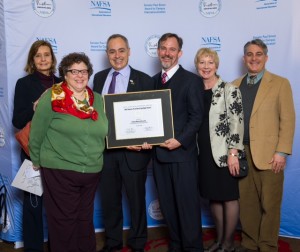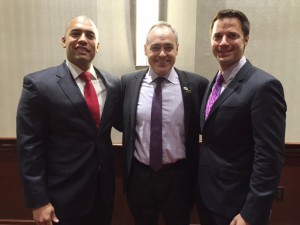Mason’s Global Problem Solving Consortium in National Spotlight
Ph.D., Sociology, University of Wisconsin-Madison
M.A., Sociology, University of Wisconsin-Madison
 |
Only two years after George Mason launched the Global Problem Solving Consortium, the university is being honored on a national scale for tackling some of the world’s most pressing issues, and is unveiling what’s ahead.
 On behalf of Mason, President Ángel Cabrera and Office of Global Strategy interim vice president Solon Simmons accepted the 2014 Senator Paul S. Simon Spotlight Award from NAFSA: Association of International Educators’ chief executive officer Marlene Johnson on Nov. 18 in Washington, D.C. The award comes as Mason observes the 15th annual International Education Week, a joint initiative of the U.S. Department of State and the U.S. Department of Education.
On behalf of Mason, President Ángel Cabrera and Office of Global Strategy interim vice president Solon Simmons accepted the 2014 Senator Paul S. Simon Spotlight Award from NAFSA: Association of International Educators’ chief executive officer Marlene Johnson on Nov. 18 in Washington, D.C. The award comes as Mason observes the 15th annual International Education Week, a joint initiative of the U.S. Department of State and the U.S. Department of Education.
President Cabrera also served on a panel addressing steps that higher education institutions can take to meet rising student demand for global language instruction, access to study abroad opportunities and international experiences needed to compete for careers in a global economy.
He says the Global Problem Solving Consortium, created in 2012 by former Provost Peter Stearns, grew out of several convictions. Universities can play an important role in tackling major world problems. Students should understand that their perspectives on those problems are not necessarily shared everywhere; there are different ways of understanding and solving particular global issues in different parts of the world.
President Ángel Cabrera (center) accepts a $50,000 gift from Jesse Gallo (left) and Eric Knobloch (right) of Cisco Systems, Inc. to develop a new, Mason global classroom initiative in 2015. Photo Courtesy of Office of Global Strategy.
1 “A consortium of universities around the world that brings students and faculty together for programs on specific world problems is addressing both issues,” explains Cabrera, “and addressing them more effectively than universities can do on their own.”
“A consortium of universities around the world that brings students and faculty together for programs on specific world problems is addressing both issues,” explains Cabrera, “and addressing them more effectively than universities can do on their own.”
Simmons agrees. “The consortium is at the heart of the idea of Mason as a university for the world,” he says. “We look forward to continuing to use this framework to build new summer workshops, research connections and other institutional links for faculty and students.”
Evan Ryan and Roberta Jacobson, both assistant secretaries of state, delivered opening remarks at the awards ceremony. Martin Simon, the son of the late Sen. Simon of Illinois, and Maureen McLaughlin of the U.S. Department of Education, gave closing remarks.
Also in attendance on behalf of Mason were Madelyn Ross and Rita Rowand of the Office of Global Strategy; Judith Green, executive director of the Office of International Programs and Services; and Professor Dann Sklarew.
Representatives also were on hand from Cisco Systems Inc. to make a $50,000 gift to Mason to develop a new global classroom initiative in 2015.
Mason’s consortium is a network of universities from eight nations: Brazil, China, India, Kenya, Korea, Russia, Turkey and the United States. Every year, the consortium holds a workshop for student fellows to examine global issues, rotating to each member institution.
In 2013 at Mason, a two-week, summer workshop led by Professor Sklarew took a closer look at water management and environmental sustainability. This year’s workshop at the Higher School of Economics in Russia focused on food security. Next summer, conflict resolution will be the topic at Istanbul Şehir University in Turkey.
Mason developed the Global Problem Solving Fellows Program for undergraduates to take a common set of courses, participate in special activities related to global problem solving throughout the school year and apply for grants to be used for study abroad.
What’s ahead? Mason plans to:
Form a Global Problem Solving Advisory Group including faculty from across the university, possibly backed by external organizations.
Offer several competitive awards to faculty/staff for research or teaching projects focused on select global problems that involve two or more consortium universities.
Explore the idea of convening a second meeting of consortium senior administrators in 2015 to set priorities and develop a list of projects for the next two to three years.
This material is presented as the original analysis of analysts at S-CAR and is distributed without profit and for educational purposes. Attribution to the copyright holder is provided whenever available as is a link to the original source. Reproduction of copyrighted material is subject to the requirements of the copyright owner. Visit the original source of this material to determine restrictions before reproducing it. To request the alteration or removal of this material please email [email protected].
rosters
IMPORTANT LINKS
- Home
- Admissions
- Academics
- Research & Practice
- Center for Peacemaking Practice
- Center for the Study of Gender and Conflict
- Center for the Study of Narrative and Conflict Resolution
- Center for World Religions, Diplomacy, and Conflict Resolution
- Indonesia - U.S. Youth Leadership Program
- Dialogue and Difference
- Insight Conflict Resolution Program
- Parents of the Field Project
- Program on History, Memory, and Conflict
- Project on Contentious Politics
- Sudan Task Group
- Undergraduate Experiential Learning Project
- Zones of Peace Survey
- News & Events
- Student and Career Services
- Alumni
- Giving




